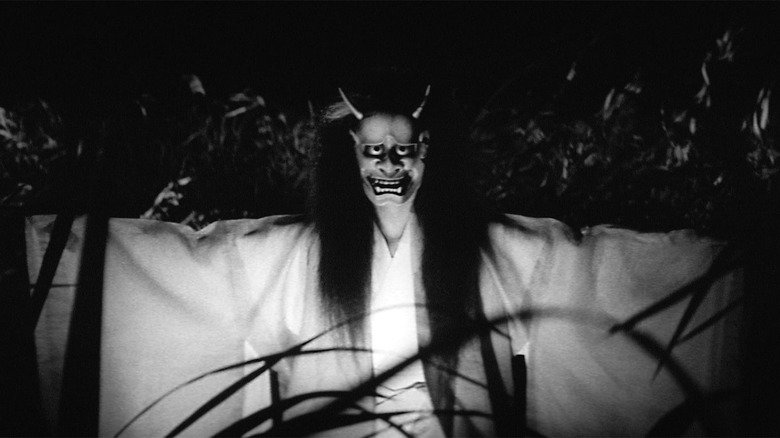We may receive a commission on purchases made from links.
Most Hollywood stars become synonymous with the films they star in, but every so often, a celebrity’s unapologetic love of another movie becomes a part of their “brand.” It’s very common with directors when their styles reflect their inspirations, most notably, Brian De Palma with Alfred Hitchcock. It’s not as common with actors, however, who are often cagey or diplomatic when talking about their cinematic likes and dislikes, because you never know who you’re going to work with (or for) in this business. We know what films an actor like Bruce Willis loves because he’s been open about it in interviews, but it’s doubtful a movie fan would sit down to watch Peter Bogdanovich’s “The Last Picture Show” and think to themselves, “You know, Bruce Willis loves this movie.”
But then there’s Willem Dafoe, who might be the world’s most passionate living fan of Kaneto Shindo’s “Onibaba.” Undoubtedly one of the greatest Japanese horror films ever made, the once-banned in the United Kingdom “Onibaba” from 1964 is often translated as “Demon Hag,” and is a stunning, monochromatic erotic-horror movie about a woman and her daughter-in-law who will do anything to survive while the men of their community are away at war. It’s famous for its mesmerizing score by Shindo’s long-term collaborator, Hikaru Hayashi, and the now iconic han’nya mask, used to “demonize the sinful emotions of jealousy and its associative emotions.”
And Willem Dafoe will talk about “Onibaba” any chance he gets. Podcasts, interviews, his Letterboxd top 4, you name it — if Dafoe sees a window to talk about the Japanese horror film, he’s taking it. Most notably, during his visit to The Criterion Closet in January of 2024, Dafoe mentioned that he loves “Onibaba” so much that he even bought the rights to the film to remake it.
Why Willem Dafoe’s Onibaba remake never happened
While in The Criterion Closet, Dafoe wasted no time gushing about his fave. “My eye goes to one of my favorite films right away, and I’ll take it. ‘Onibaba’ — a very, very special film,” he said as he pulled the title down from the shelf. “In fact, I wanted to remake it, and I even got the rights for a while, but I couldn’t find a way to do it because it’s so specific to its time and I felt like any time I tried to put a spin on it I ruined the source material, so I couldn’t do that.”
“Onibaba” is set somewhere in Japan near Kyoto, in the mid-14th century, at the beginning of the Nanboku-chō period, shortly after the Battle of Minatogawa. Dafoe is right, remaking this film and removing it from the context of the time period and country from which it is set would dilute its power. It’s why so many of the Americanized remakes of Asian horror films in the 2000s following the success of “The Ring” were colossal disappointments. The cursed videotape of “Ringu” crossed over nicely to television-obsessed American audiences in “The Ring,” but when 2005’s “Dark Water” obliterated the delicate examination of a mother/child dynamic from 2002’s “Honogurai Mizu No Soko Kara,” the film was a massive disappointment. Something would be lost if “Onibaba” was remade, and Dafoe recognizing this and choosing not to remake the film when he could is proof that he’s the best kind of movie fan out there.
Since the 1994 VHS release, all versions of “Onibaba” have been released uncut, and you can purchase it from The Criterion Collection by clicking here.






